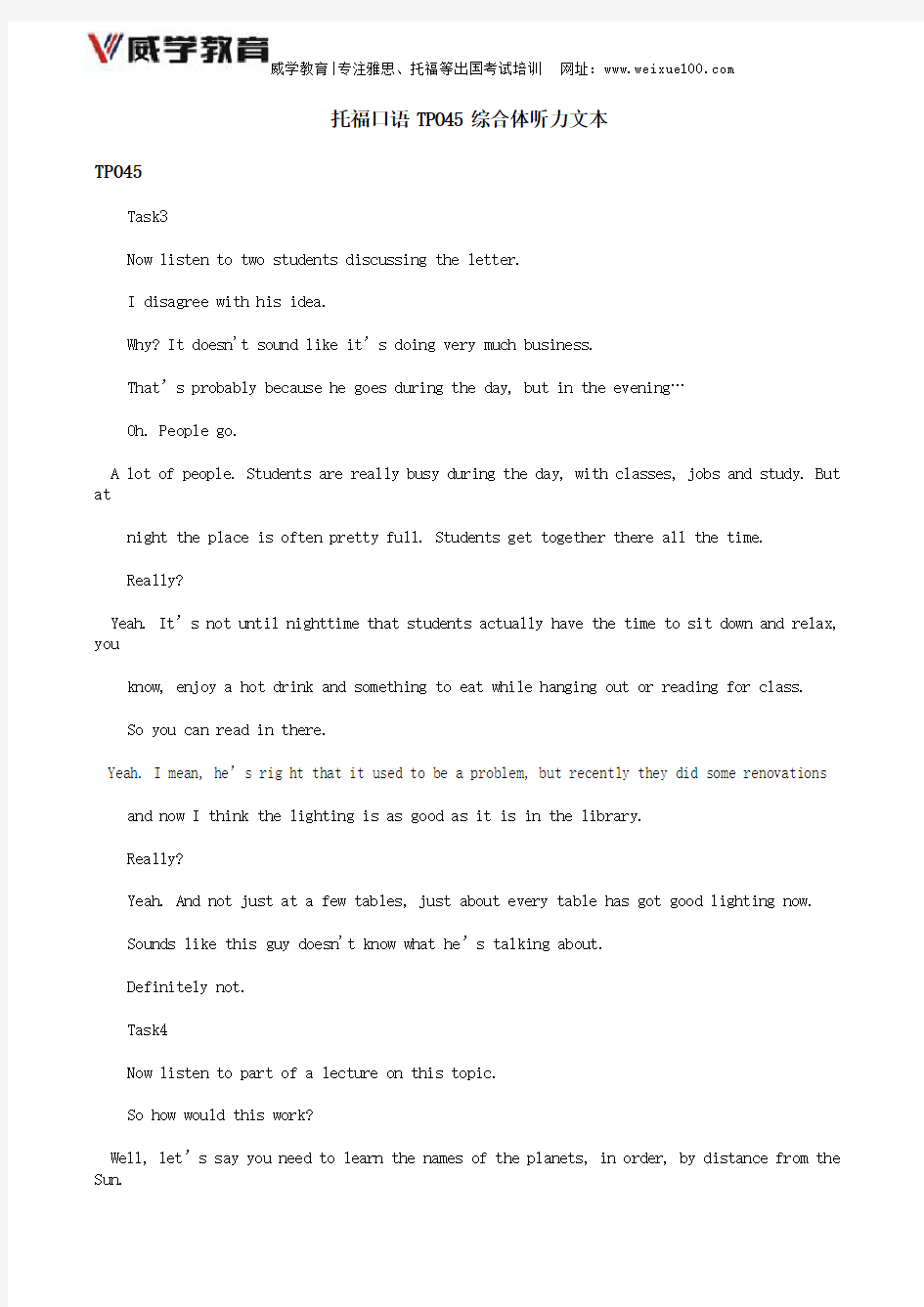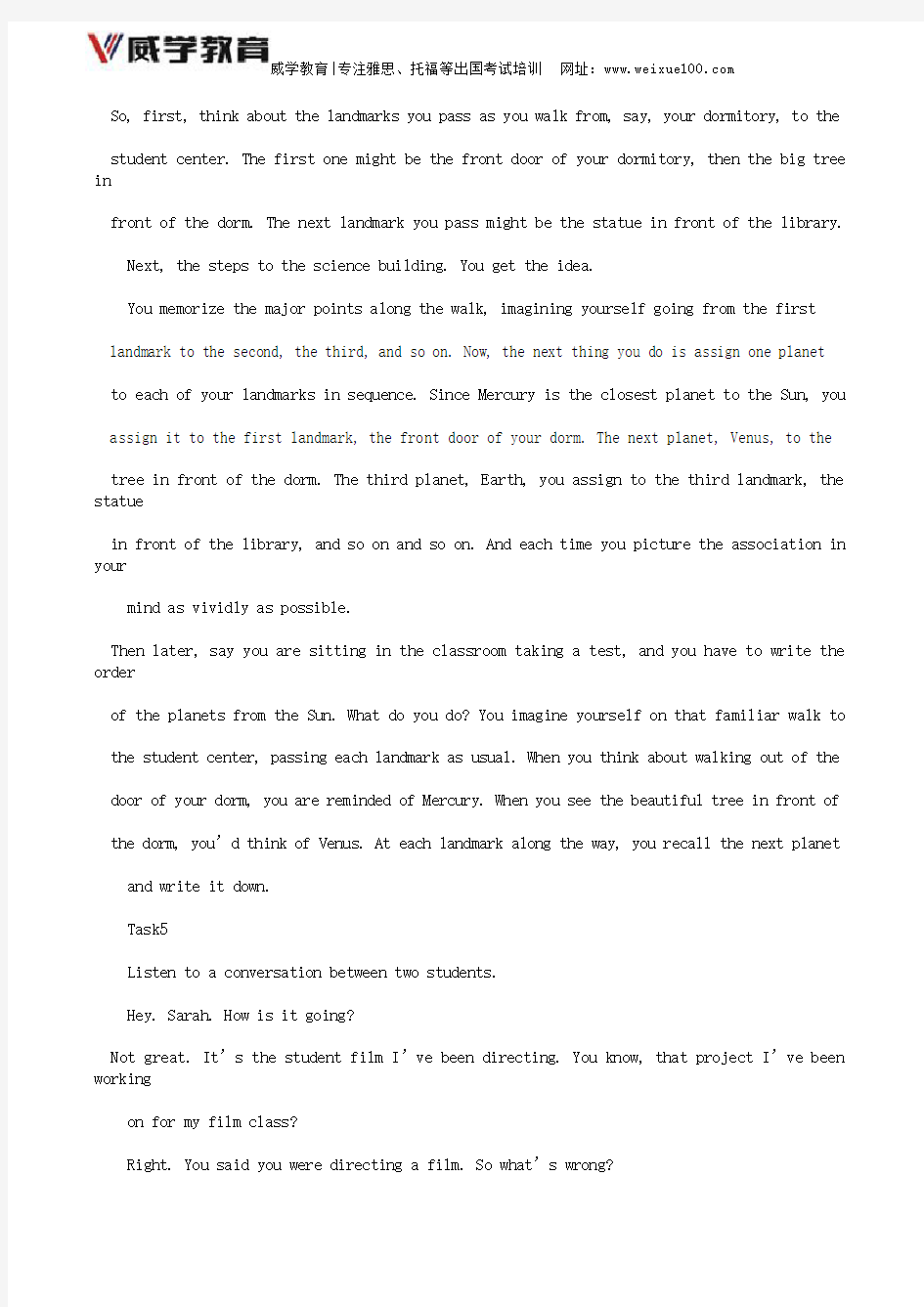【威学教育】托福口语TPO45综合体听力文本


托福口语TPO45综合体听力文本
TPO45
Task3
Now listen to two students discussing the letter.
I disagree with his idea.
Why? It doesn't sound like it’s doing very much business.
That’s probably because he goes during the day, but in the evening…
Oh. People go.
A lot of people. Students are really busy during the day, with classes, jobs and study. But at
night the place is often pretty full. Students get together there all the time.
Really?
Yeah. It’s not until nighttime that students actually have the time to sit down and relax, you
know, enjoy a hot drink and something to eat while hanging out or reading for class.
So you can read in there.
Yeah. I mean, he’s rig ht that it used to be a problem, but recently they did some renovations
and now I think the lighting is as good as it is in the library.
Really?
Yeah. And not just at a few tables, just about every table has got good lighting now.
Sounds like this guy doesn't know what he’s talking about.
Definitely not.
Task4
Now listen to part of a lecture on this topic.
So how would this work?
Well, let’s say you need to learn the names of the planets, in order, by distance from the Sun.
So, first, think about the landmarks you pass as you walk from, say, your dormitory, to the
student center. The first one might be the front door of your dormitory, then the big tree in
front of the dorm. The next landmark you pass might be the statue in front of the library.
Next, the steps to the science building. You get the idea.
You memorize the major points along the walk, imagining yourself going from the first
landmark to the second, the third, and so on. Now, the next thing you do is assign one planet to each of your landmarks in sequence. Since Mercury is the closest planet to the Sun, you assign it to the first landmark, the front door of your dorm. The next planet, Venus, to the
tree in front of the dorm. The third planet, Earth, you assign to the third landmark, the statue
in front of the library, and so on and so on. And each time you picture the association in your
mind as vividly as possible.
Then later, say you are sitting in the classroom taking a test, and you have to write the order
of the planets from the Sun. What do you do? You imagine yourself on that familiar walk to the student center, passing each landmark as usual. When you think about walking out of the door of your dorm, you are reminded of Mercury. When you see the beautiful tree in front of the dorm, you’d think of Venus. At each landmark along the way, you recall the next planet and write it down.
Task5
Listen to a conversation between two students.
Hey. Sarah. How is it going?
Not great. It’s the student film I’ve been directing. You know, that project I’ve been working
on for my film class?
Right. You said you were directing a film. So what’s wrong?
Well, the project is due in two days. We were supposed to film a final scene today, but it’s
raining. The scene is supposed to be set outside, with two characters talking in the park on a
beautiful sunny day.
Oh no! What are you going to do?
Well, I could rewrite the scene I guess, I could revise it so it takes place inside a building instead, maybe here in the student center somewhere.
Why don't you do that?
I could, but I’m happy with the scene as it’s written now. The film has an op timistic happy ending. That’s why I wanted the last scene of the movie to be outside on a bright sunny day, because it sets a positive mood.
Oh… I see. Well, the weather is supposed to be better tomorrow, sunny and warm. Why
don't you film that scene tomorrow instead?
Thought of that too. But since the project is due the day after tomorrow, I was planning on using tomorrow to review the film and do any final ending, and… you know, all the last- minute details.
That’s true. There wouldn't be much time for that.
Yeah. Filming tomorrow might mean turning in a project to my professor that’s not as polished, not as good as I’d like it to be.
Task6
Listen to part of a lecture in a marine biology class.
So we’ve talked a little about how f ish use senses like vision, touch and so forth, but what i
want to talk about now is a special ability some fish have. The ability to produce electricity in
their bodies. You are probably familiar with these fish, these fish that send out electric currents from their bodies naturally.
So what’s the purpose of this? Well as you might expect, it can serve some important roles in
helping fish survive.
First, fish, like all animals, need food to survive. Well, the ability to produce electricity helps
some fish to capture prey, you know, other organisms in the water that they eat. Take the
electric eel for example. The eel produces a strong electric current in its body. When the eel
comes into contact with one of the smaller fish it depends on for food, the electric current
that it sends out shocks the smaller fish and paralyzes it. It’s not able to get away from the
eel. The eel captures the fish easily and can eat it at its leisure. So this ability to use
electricity to capture prey ensures that the eel gets the food it needs to survive.
The ability to produce electricity also helps fish to successfully navigate their environment by
detecting nearby objects. Some fish have poorly developed eyes. And the water they live in
can be muddy and dark. Now, there’s a fish called the knife fish that produces electricity. This
creates an electric field around the knife fish’s body. When the knife fish swims close to, say
a rock, it sends a disturbance, um, an interference in its electric field. The fish then realizes
that there’s a rock nearby and that it has to avoid crashing into it. Once this happens, the
knife fish swims away from the rock and thus avoids harming itself.
